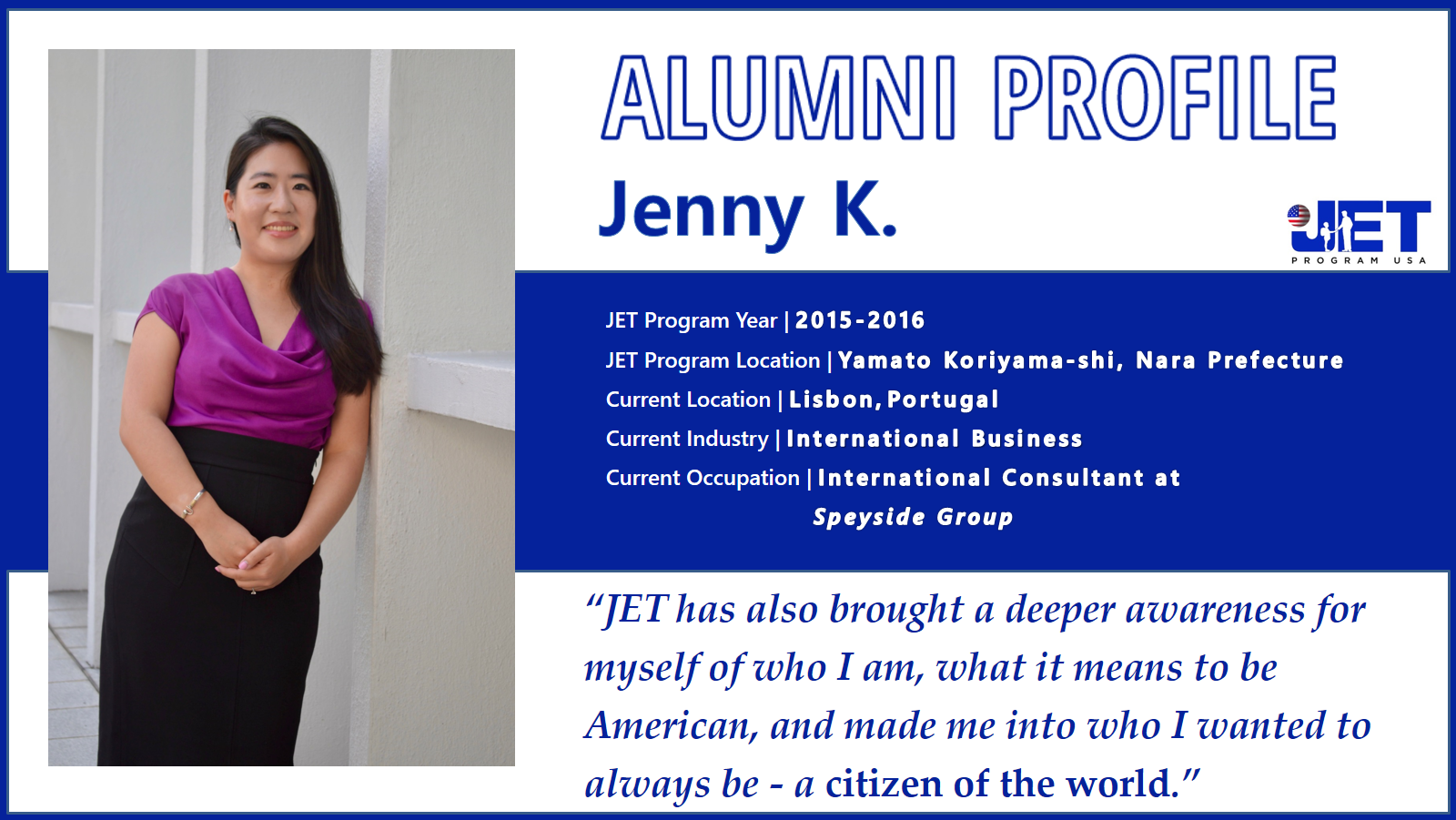An interview with Jenny, a Yamato Koriyama city, Nara prefecture JET Program alumni, who now works as an international consultant in Lisbon, Portugal, for the Speyside Group, an organization that provides consultancy on policy matters.
How did your JET Program experience prepare you for your current position?
After college I had initially thought I would go to law school. But after doing paralegal work for a few years, I quickly realized I did not want to become a lawyer, but wanted to use a law degree to do something policy related. In the U.S., law schools are astronomically expensive and the market is saturated. Public policy is a fascinating intersection between disciplines, and I felt a policy degree would lead me to where I wanted to be quicker. That led me to taking the plunge and applying to Public Policy programs rather than law school during my time in Japan. Boy, am I glad I made that decision. JET was pivotal in giving me the time and space of one year to reflect and realign my career.
Luckily, I was recruited by a current colleague on LinkedIn after graduating from my Public Policy program. Make sure you have a strong LinkedIn profile and update it regularly. You never know what opportunities can surface. LinkedIn is also a great place to search for jobs. There are a variety of filter settings and it is very useful for setting up informal interviews. Take advantage of your networks, reach out to people, and ask questions about their experiences – more often than not you will be surprised by how kind people are because they have been in your shoes before.
How did your JET Program experience prepare you for your current position?
Having been in Singapore for a few years after JET, and now being in Lisbon, it has made me realize just how resilient I can be. Moving to a new country requires an individual to be a self-starter and be constantly making an effort to connect and keep perspective, and JET helped with that. On a personal level, JET also brought a deeper awareness for myself of who I am, what it means to be American, and it made me into who I wanted to always be – a citizen of the world. Given that my company is extremely international, and requires many of its employees to relocate, my employer, I would imagine, viewed my experience at JET as evidence of my ability to adapt and thrive in new cultures and contexts.
Also being a teacher at 16 different middle schools and kindergartens in Koriyama taught me to be confident in front of a large group of strangers since having had so many schools/classes assigned, I rarely got to know my students well. Middle schoolers are also not always the most well-behaved, and are often snarky. But even with these kids I learned to take charge of a room and win the confidence of my students all while enjoying myself, which is invaluable in all sorts of business and professional settings.
What is your most memorable JET Program experience?
There are so many experiences I will cherish, from the most mundane, like riding my bike through narrow streets to school, to some wonderful conversations I shared over dinner with local and JET friends. But one of the greatest experiences was seeing the joy on my kindergartners’ faces when I taught them a new song or game, and when they would come to my regular picture book readings at the local library. It made me so happy to see children so enthusiastic about learning. Many times as adults we grow anxious about learning a new language – I hope to remember this as I begin to learn Portuguese myself.
What advice would you give to current and future JET Program Participants?
My advice for JET applicants would be not to be so anxious about how future employers will view JET on your resume. There are so many skills you learn both transferable and intangible. Not to mention it is also character-building and a once-in-a-lifetime opportunity. For those in career transitions, JET is a fantastic opportunity to reassess what you want to do. For JETs looking to establish a career afterwards, take advantage of your networks like other JETs, college alumni and so on. Go on LinkedIn, do some research into people who are doing what you aspire to do. Reach out, ask them how they did it, and if you are lucky, they will be able to pass on your resume. At the very least you will be getting some valuable wisdom from professionals who may wish they had known some things beforehand.

